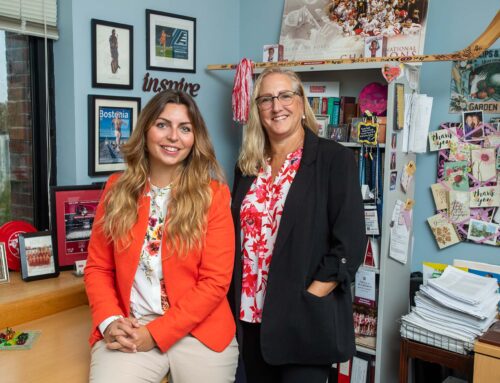SOUTHWICK — Layla Plante is one of more than 30 million people in this country who suffer from eating disorders that can have devastating mental and physical effects, including death.
The Southwick Regional School seventh grader was recently diagnosed with a condition known as avoidant restrictive food intake disorder, or ARFID. Ever since Layla was 3 years old, she had challenges eating a variety of foods. She was diagnosed in August, when she was 12, and entered treatment a Walden Behavioral Care clinic. Walden operates a number of facilities in Massachusetts and Connecticut that provide personalized treatment and support for individuals and families affected by all forms of eating disorders.
“We knew Layla had significant eating challenges since she was a young child, but we didn’t have a name for it,” said Karen Plante, her stepmother.
According to NEDA, the National Eating Disorders Association, ARFID is a new diagnosis in the Diagnostic and Statistical Manual of Mental Disorders, 5th Edition. It was previously referred to as “selective eating disorder.” A misunderstood and underdiagnosed disorder involving extreme limitations on what someone will eat, NEDA states on its website that ARFID is similar to anorexia, since both disorders involve limitations in the amount or types of food consumed. But unlike anorexia, ARFID doesn’t involve any distress about body shape or size, or fears of fatness.
This is Eating Disorder Awareness week, which is why Layla and her stepmother are sharing her story. For many years, Layla lived on just applesauce and oatmeal — afraid she would choke. Layla also struggled with different food textures. Layla had anxieties about eating and didn’t like to eat around other people. She struggled with the smells of different foods and was afraid people would touch her after touching different foods, such as chips. She had no appetite or energy, which dramatically affected her mental and physical health. She struggled to connect with her peers, and was unable to eat in restaurants, in the school cafeteria or at birthday parties.
“It was sad,” recalled Layla. “I didn’t know what I was missing. Everyone kept telling me I was missing out on eating other things. I regret that I didn’t try things sooner.”
Layla added that she felt bad about not participating in some activities, but didn’t even have the energy to go to parks and play.
“I struggled making friends because of how different I was because of my eating disorder. It made me feel heartbroken,” she said. Layla remembers kids making fun of her because of what she was eating. “They didn’t understand me.”
Karen said she felt terrified and hopeless as she tried get care for Layla. She feared for Layla’s future and worried how the eating disorder would affect her long-term health.
“I was worried it would impact her ability to get a job, have functional relationships, and possibly her ability to live on her own,” she recalled.
But Karen’s biggest fear was that there wouldn’t be a proper treatment for her stepdaughter.
“I was afraid this would be a lifelong issue for Layla — or worse, that she could die from it,” she said. “We tried to find Layla help as best we could, but there aren’t a lot of options out there.”
She added that some outpatient food therapy programs Layla tried were never successful.
“I’m a nurse and ARFID isn’t a diagnosis I’d ever heard about until I started to do research for a treatment for Layla,” Karen said.
Plante said they researched facilities that are available, but found very few to choose from.
“I knew from my profession that Walden was the best in this area for eating disorders,” she said.
Layla began treatment for her disorder for a short time at an intensive outpatient program. When she didn’t make enough progress, she became an inpatient for a brief time. Layla’s next step was partial hospitalization, again, initially remote, until she entered a hybrid program at Walden’s clinic in South Windsor, Conn.
“We were desperate to get her help. We really feared the worst as her weight became critically low,” said Karen. “We were very hopeful that this was the right program for her — that she would finally get the help she needed.”
Karen and her husband, Alain, along with other family members, stayed with Layla every day during her treatment — actively participating with Layla in the program to learn how to help her.
“This was an intensive program, most of it remote. We assisted with the program from our home via Zoom meetings,” she said.
Layla transitioned to Walden’s new ARFID intensive outpatient program when she gained enough weight.
“It was a long journey,” said her stepmother. “She was finally discharged at the end December once she met her goal weight of 78 pounds. She was 54 pounds when she started.”
Life for Layla has been better and easier since she’s been treated treatment for ARFID.
“School is good because people are way nicer and I’m more excited to go,” she said. “I’m getting there with doing more things. I want to be a part of the drama club and I’ve signed up for the unified sports track team.”
She said she still suffers from ARFID, but not nearly as much.
“Every day is a challenge and I have to push myself every day,” Layla said. “My last birthday was easier because food was less stressing. Now I have few good friends and I’m learning about the experience of having friends.”
When things are hard for her, Layla uses her comfort items — mostly her little stuffed pony animal — and the skills she was taught during her treatment.
“There are so many I learned — from taking deep breaths to thinking positive,” she said. She said the hardest part of her journey was being judged for who she is: “Taking the first bite of something new was the worst — like when I ate a piece of apple. It was a little scary. At one point, I thought I wouldn’t make it through. All the support from Walden and my family helped me keep going.”
Karen said it took nine years to get an answer to why Layla had challenges with eating.
“We had heard of ARFID a few years prior, but Layla wasn’t formally diagnosed until she started the program. All the eating disorder programs we found were for age 12 and up — so we never found any programs for her when she was younger.”
Karen’s advice for other families with someone who has an eating disorder: Get into a program as soon as possible and do a lot of research to understand the disorder.
“It’s easy to say, ‘just eat,’ but until you can understand why someone may struggle with the textures and fears, it’s hard to provide enough support for them. Also, surround yourself with a strong support system of family and friends. It’s a long and challenging journey,” she said.
Additionally, Karen recommends connecting with support groups and taking advantage of all the support from the eating disorder treatment facility.
“The treatment is not just for your loved one, but it also involves a lot of therapy, education, and effort from the entire family unit for your loved one to be successful.”
She and Alain took a lot of time off from their work to support Layla. Ultimately, her husband took a leave of absence because Layla needed consistent daily support.
“It was like having a full-time job to fully support her in the program. Fortunately, our insurance covered the treatment fully, so there were no out-of-pocket expenses.”
Layla, who turned 13 in November, still struggles with her eating disorder today. Plate said the difference now is that they have the tools — and the resources — to help her continue to improve.
Following her treatment for avoidant restrictive food intake disorder, Layla Plante has become more engaged in activities at Southwick Regional School, where she’s a seventh grader. This photo was taken recently when she was on a school field trip and did some cross-country skiing.
Watch for ARFID warning signs
The National Eating Disorders Association lists the following as warning signs or symptoms of avoidant restrictive food intake disorder, or ARFID.
Behavioral and psychological:
· Dramatic weight loss
· Dressing in layers to hide weight loss or stay warm
· Constipation, abdominal pain, cold intolerance, lethargy or excess energy
· Consistent, vague gastrointestinal issues (“upset stomach,” feeling full, etc.) around mealtimes that have no known cause
· Dramatic restriction in types or amount of food eaten
· Only eating certain textures of food
· Fears of choking or vomiting
· Lack of appetite or interest in food
· Limited range of preferred foods that becomes narrower over time (i.e., picky eating that progressively worsens).
· No body image disturbance or fear of weight gain
Because both anorexia and ARFID involve an inability to meet nutritional needs, both disorders have similar physical signs and medical consequences.
· Stomach cramps, other non-specific gastrointestinal complaints (constipation, acid reflux, etc.)
· Menstrual irregularities — missing periods or only having a period while on hormonal contraceptives (this is not considered a “true” period); or stopping menstruation altogether for girls and women past puberty
· Difficulties concentrating
· Abnormal laboratory findings (anemia, low thyroid and hormone levels, low potassium, low blood cell counts, slow heart rate)
· Dizziness
· Fainting or syncope
· Feeling cold all the time
· Sleep problems
· Dry skin
· Dry and brittle nails
· Fine hair on body (lanugo)
· Thinning of hair on head; dry and brittle hair
· Muscle weakness
· Cold, mottled hands and feet, or swelling of feet
· Poor wound healing
· Impaired immune functioning







